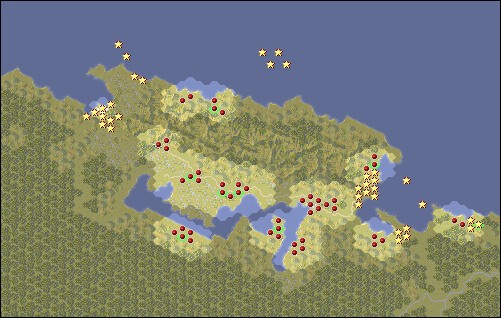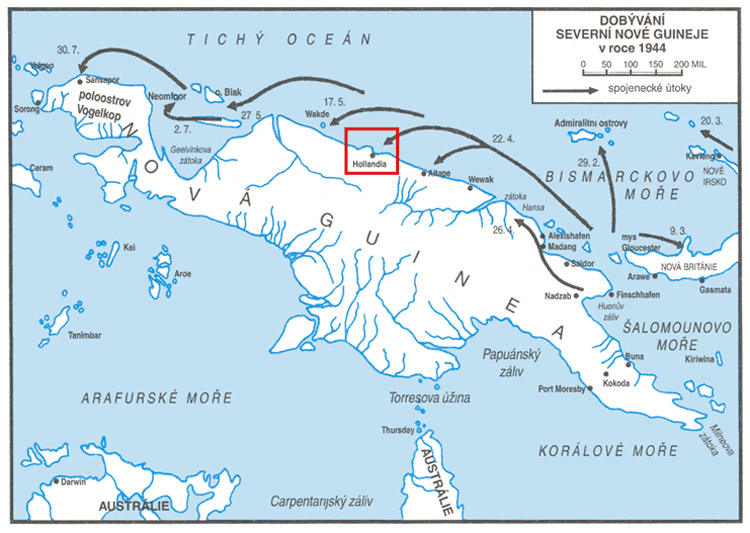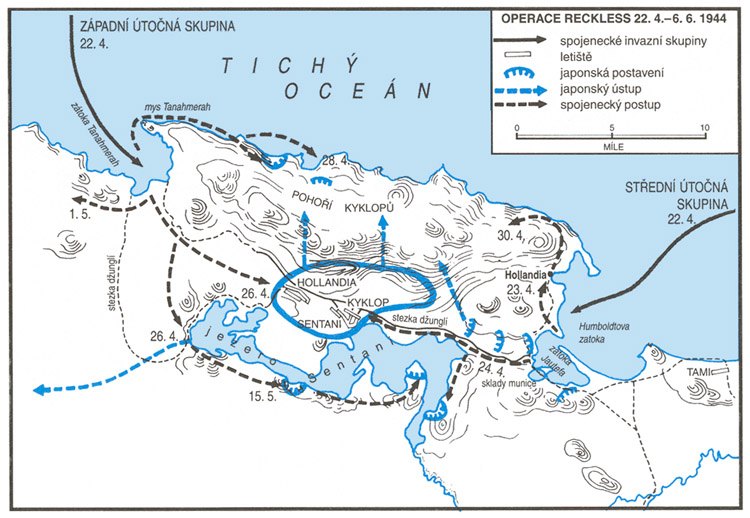 When you move the mouse pointer over the map, unit name, strength and coordinates are displayed as a label. When you press terrain button object name is displayed (city, river, sea, ...) |
Hollandia
22.4.1944 - 6.6.1944
PacPG: 22.4.1944 - 6.6.1944
Scenario Map:
|
|
|
Changes and corrections of map:
|
Scenario author: Scenario origin: Last revision date: |
stanny 19.6.2011 20.6.2011 |
First release: Revision released: |
- - |
| Totally new scenario. This encounter is also shown as part of a larger campaign along the New Guinea coast in the scenario New Guinea 44 (PacAGPG1) which is possible to play just as a single scenario. |
Historic overview:
... At approximately 800 kilometers north coast from the Geelvink bay to the eastern border of Dutch New Guinea, there is only one port with an excellent anchorage, the Humboldt Bay at Hollandia. Hollandia was for a long time the major Japanese rear supply base in New Guinea and also served as an important center of reloading cargo and the troops transported here by large transport ships. (Miloš Hubáček - Ofenziva v Pacifiku, Mladá fronta, 2000) Article on English Wikipedia
| ||||||||||||||||||||||||||||||||||||||||
Game play matters:
| Campaign play: Lose leads to scenario Leyte Gulf. In case of Minor victory follows Leyte Gulf too, but according previous development of campaign is here possibility to choose also Tinian and Guam. After Major victory follows Leyte Gulf or Tinian and Guam, according previous development of campaign. |
Scenario data:
|
Map size: 63 x 39 hexes 16 turns, 3 days per turn Version: PacPG 1, Starting side: Axis, Campaign: Japanese campaign, Order in campaign: 17. |
||||||||
|
||||||||
|
||||||||
|
||||||||
|
||||||||
|
Game time costingness of scenario: 16.15 % (product of units and turns numbers divided by difference between the most long and the most short scenario) |
||||||||
|
Number of Axis units: 51 units, from them are 25 core units and 26 auxiliary units 3 air units, 0 naval units and 48 ground units 0 of units are loaded to air transport and 0 to naval transport |
Transports Air/Naval: Axis - Allies 0/0 - 2/16 |
|||||||
|
Number of Allied units: 45 units 9 air units, 8 naval units and 28 ground units 0 of units are loaded to air transport and 0 to naval transport |
Initial prestige + every turn donation: Axis / Allies 614 + 57 / 500 + 0 |
|||||||
|
Max number of Axis units: 57 units, from them are 31 core units and 26 auxiliary units - on start of scenario is possible to purchase 6 unit (6 core + 0 auxiliary) |
||||||||
|
Max number of Allied units: 45 units - on start of scenario is possible to purchase 0 unit |
||||||||
Transport units:
|
||||||||
|
| Axis units: Kyoka Hohei 1943 (Infantry HW 1943) (Japan) Hohei 1943 (Infantry 1943) (Japan) Senpaku Kohei (Engineers - SNLF) (Japan) Hohei 1940 (Infantry 1940) (Japan) Hohei 1936 (Infantry 1936) (Japan) Type 97 Te-Ke (Japan) Type 94 TK (Japan) Type 1 47mm (Japan) RA 97 (Japan) Type 94 37mm (Japan) Type 94 75mm (Japan) Type 91 105mm (Japan) Type 92 70mm (Japan) Meiji 38 Improved 75mm Field Gun (Japan) Type 98 20mm (Japan) Type 88 75mm (Japan) Ki-61 Tony (Hien) (Japan) Ki-43 Oscar (Hayabusa) (Japan) Ki-48 Lily (Japan) |
Allied units: Infantry HW 43 (USA) Infantry 43 (USA) Bridge Engineers (USA) M4A1 Sherman (USA) M5 Stuart (USA) Raiders&Dogs (USA) US 57mm ATG (USA) US 105mm Gun (USA) US M8 Howitzer Motor Carriage Scott (USA) US 75mm Gun (USA) 3´´ AD (USA) F6F Hellcat (USA) P-38 Lightning (USA) SB2C Helldiver (USA) B-25H Mitchell (USA) B-25B Mitchell (USA) Destroyer (USA) Battleship class Iowa (USA) Heavy Cruiser (USA) Heavy Aircraft Carrier (USA) US M2 Halftruck (USA) US GM Truck (USA) |
The same time period scenarios:
| New Guinea 44 (PacAGPG 1), Burma 44-45 (PacAGPG 2), Formosa (PacAGPG 2), Hollandia (PacPG 1) |
| Bewani River Cape Djar Cape Soeadja Cape Tanahmerah Cyclops Drome Cyclops Mountains Depapre Hollandia Hollandia Airfield Humboldt Bay Display all mapnames in list... |
Tactical map (large & detail):

|
|
|
|
Basic map |
|
|
Map with unloaded transports and order numbers of units |
Battlefield map:


|
|